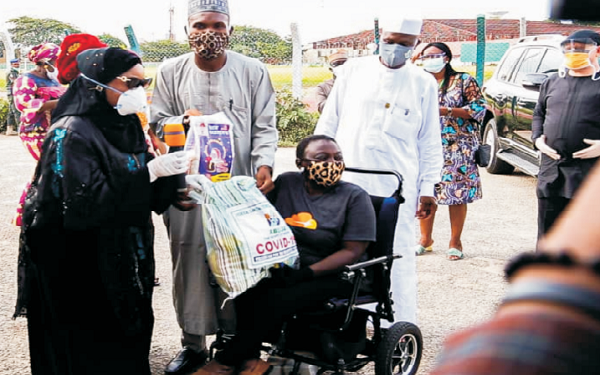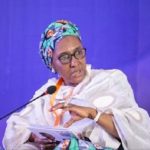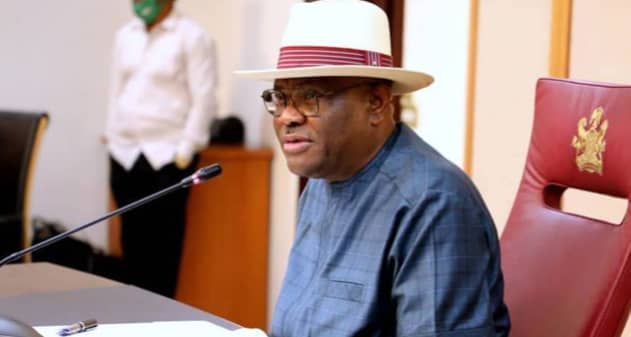If able-bodied people have problems coping with the lockdown, how much less those of us who are physically challenged?” These were the words on the lips of nearly every person living with disability (PWDs) spoken to by Sunday Nation in the heat of the Covid-19 lockdown.
Indeed, the lockdown has been difficult to cope with, and understandably so. However, while many Lagosians have taken to the streets in defiance of the lockdown order, PWDs that spoke with this reporter are of the opinion that it is for everyone’s good and are trying hard to comply. But like many Lagosians, they are hungry and in need of food, cash and other relief materials.
The highs and lows
Tade Ladipo Emiola, a visually impaired man who lost his sight at the ripe age of 31, works for a not-for-profit organisation. Aside locking him in, Emiola said the lockdown has also affected his wife’s business, with which she’s been supporting the family.
“Life under this lockdown is very difficult. We have been living on assistance from friends.” He said.
To this extent, Emiola said feeding has become increasingly difficult and he and his wife have had to adopt the one meal a day strategy.
“The kids are all home now; when they had to go to school, once you gave them breakfast, the next time they would eat is when they returned from school or work, as the case may be. But now that they are at home, it’s a little difficult. What we do now is that their mother doesn’t start cooking until 3pm, so that by the time she rounds off cooking and is ready to serve them, it will be getting to 4/5pm. That’s all the meal we have for the day. During the morning period, my wife keeps them busy with chores, or sometimes buys N50 egg roll as a palliative, pending when she cooks.”
To compound their woes, Emiola said electricity supply has also been a major issue. “If you don’t have food to eat and you’re able to watch some comedy, that could lighten your mood a little before you go back to thinking about food.”
In the words of Taofik Owoiya, another visually impaired man, “The two weeks have really been tough for me. We have been waiting to receive what the government promised to give as palliative. We got message from LASRRA (Lagos State Residents Registration Agency) and did what they asked us to do, but we haven’t heard from them yet. We have almost exhausted all the money in the house.”
Chuks Ejelonu, also visually impaired, however, said life under lockdown is okay. Even though he and his wife’s sources of income have been cut off, he has managed to remain optimistic. “My wife is a petty trader and I’m into music and used to go to studios to do one or two things. But all our sources of income have been shut down now. It hasn’t been easy at all. We’ve had to fall back on our savings and see how we can spread it over time. Some friends too have been helpful.”
Ejelonu believes that “staying at home is actually more beneficial than going outside to contract something you know nothing about.” He therefore encouraged people to obey government directives.
Biola Rahaman moves about with a wheelchair. She told the reporter that life under lockdown has not been “really easy. It’s not even easy for able-bodied people, much less people with disability.”
Victor Osadolor, another visually impaired, described the lockdown situation as ‘tense,’ adding that it is not easy to stay in a place for a long time. He however said, “One has to bear it because when you consider why the government declared the lockdown, you’ll know that it’s for our benefit, and all we need to do is to bear and be patient, so that the purpose the government declared the lockdown will be actualised. It’s just that the hardship involved is a lot.”
Kehinde Adeyingbo, who is physically challenged and moves about in a wheel chair, is the Chairperson of National Association of Persons with Physical Disability (NAPID) and a coordinator of The Joint National Association of Persons with Disability (JONAPID) Ikorodu Division. She said, “The lockdown is not so easy for our people.”
And as for Emmanuel Pepsy Olawoyin, also visually impaired, “The lockdown would have been okay if I had a lot of money. People need my help and I don’t have enough money to go round. But on the other hand it is good, because it’s keeping me away from coronavirus. Light in Ebute in Ikorodu where I am is not so bad. As I am talking to you, there’s light and my fridge is quite frozen. I can drink from my green bottle as I wish.”
Visually impaired undergraduates neglected under lockdown

Some visually impaired undergraduates also shared their experiences. Lilian Odey, a part four student of the University of Nigeria, Nsukka, said “Life under lockdown is not cool. Normally, it’s not as if I’m the outing type, but not being able to meet with friends and family can be really boring and too routine a lifestyle. I would have been counting down days to graduating, but now it has been extended.”
Besides, Odey complained, “No light. It’s crazy, because most of the gadgets we use to keep ourselves busy need electricity. So, everything is kind of slow.” She said.
Chukwubueze Isaiah Elume, a part two student of Nnamdi Azikiwe University, Oka said “We are just trying our best to stay positive. We are supposed to be writing our first semester exams as we speak, but this lockdown has halted everything.”
Emeka Oliseh, a blind part two Political Science student of Nnamdi Azikiwe University, Oka said, “The lockdown is not funny at all. The government is not doing anything. I’m still in school, as we speak. I could not go home before the lockdown was declared. Our government isn’t considering the physically challenged. If you check statistics, most physically challenged people are not from rich homes. I don’t want to say anything that isn’t pleasant to the hearing, but it’s unfair.
“Where are all the donations the government is getting, going? Are the physically challenged people being reached? We are the most affected; even when there was no lockdown, it has never been easy, much less now that there is lockdown. We have been surviving by the help of private individuals, not the government.”
What palliative?
Despite Lagos State government’s efforts at cushioning the effect of lockdown through the distribution of palliative to residents, many persons with disabilities spoken to lamented uneven distribution.
Said Emiola, “Two weeks ago, I got a text asking if I was still at the address I registered with LASRRA because I had been selected to receive some palliative. I was asked to reply “FOOD YES”. I tried texting this for five days and it did not go. I stumbled on a radio programme where Dr Adebayo, chairman of JONAPID and the Commissioner for Agriculture were on air. The commissioner said the chairman had been given palliative to share to physically challenged persons in Lagos. His number was also given. I called the number and was asked to text my details; up till now, nothing has been sent.
“I called Dr. Adebayo to complain and he said his own was just to collate about 600 names that they wanted to distribute to and not to monitor it. If others have been given, I cannot tell, but I haven’t received anything.”
In the same vein, Owoiya said, “I haven’t seen anything yet. We have just been hearing over the radio that they’re going to consider the PWDs. I’m a member of JONAPID and other associations for visually impaired people. Some people have said they got the palliative through Dr, Adebayo.”
Ejelonu revealed, “The government told us that they will do something, but we haven’t seen anything, even those of us registered with LASRRA.”
Visually impaired Olufemi Taiwo said, “Last week, Chairman of my association for Oshodi told me that they wanted to share something to us. When I got there, I was given some packs of sugar, noodles and garri that was not up to five cups.”
Elume also said, “I’ve been hearing that they have been giving out things to people, but I have not seen anything at all.”
He is not registered with any association for physically challenged persons in Lagos because, “I’ve been trying to register under the National Association for the Blind (NAB) for a very long time and it didn’t really work out every time I tried.
Odey also said she hasn’t received any palliative, even as she conceded that this may be because she is not registered with any association.
Rahaman’s response was somehow affirmative. She said, “Thank God for Lagos State government that distributed food items, but it’s not enough. They brought 2kg of semo, 2kg of wheat and 15 packs of noodles. I think Anglican Church donated it to Lagos State. I had been hearing that they were sharing things, but I never received anything; so I called Mrs. Uri who had been reaching out; she was the one who connected me with the people in my area.”
Osadolor has also received palliative from the government. “There was a day I received a call to go to either the General Hospital in Ifako Ijaye or NRC – that’s where JONAPID asked us to go. When I got to the hospital, they had left; so I went to meet them at NRC. When I got there, my name was on the list and a bag containing rice, beans, garri, ten sachets of Bournvita, milk, groundnut oil and about 5 packs of sachet tomatoes was given to me. People who got the information and came that day were given.”
Osadolor also wanted to know what has become of the palliative the federal government promised to give to vulnerable people, noting that they had collected their details, including bank details.
Adeyingbo revealed that “the Lagos State government and some foundations like the Empathy Driven Women International Initiative (EDWII) have been very helpful. But there is still something that people are lacking, which is cash. As I’m talking to you now, I have food stuff at home, but I don’t have the money to buy gas and other ingredients to cook them.
“Besides, many of my members have not received the palliative. What was sent to us in Ikorodu West was just for four people. The whole of Ikorodu Division was given 13 packs, which we shared among the three zones. I complained to JONAPID and later, the Ministry of Agriculture. They promised that they were coming back.”
Olawoyin said, “I have received palliative. I’m coordinating Ikorodu; and as the saying goes, “a person that is feeding a child will always know the taste of the food.”
He however revealed that a lot of physically challenged persons have not received anything.
“I know government can’t reach everybody, but how many physically challenged persons are there? They should be able to reach every one of us, or at least those that are registered with LASRRA. There was this distribution of palliatives that Madam Uri of EDWII did here; most of them told me they didn’t have money to come here. I had to pay for their bike fares. These people don’t have money.”
Noting that the federal government has not been very responsive to persons with disabilities, Olawoyin said, “If not for lockdown, who is asking government for money? Government is not responsible. I’m an APC person in this Ikorodu and I haven’t received a single thing from my party. People have suggested that government should share money to PWDs using our BVN, but they keep giving excuses about not having our statistics. But they know how to reach us during elections.
“Thank God Lagos state is even trying with assistance from NGOs like EDWII, Project Africa, the Anglican Church and The RCCG.”







